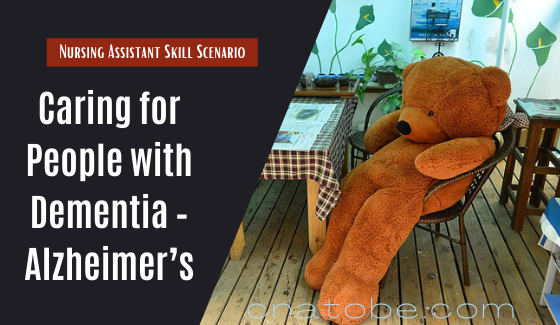
Dementia is a general term that refers to a serious loss of mental abilities such as thinking, remembering, reasoning and communicating. (De means from. Mentia means mind.)
Symptoms of Alzheimer’s disease appear gradually. Alzheimer’s disease begins with memory loss. They eventually cause dementia. As the disease progresses, it causes greater and greater loss of health and abilities.
People with Alzheimer’s disease may get disoriented. They may be confused about time and place. Majority of the sufferers are eventually completely dependent on others.
Nursing Assistant Skill Scenario: Care for People with Alzheimer’s Disease
Our nursing assistant online class teacher gives us this scenario: “Caring for People with Dementia – Alzheimer’s”.
Marvin is 78 years old. He suffers from Alzheimer’s disease and is new to your facility. His history shows he is a retired cabinetmaker and repair shop owner.
Today he is in the dining room before breakfast and he picks each wooden chair up, places in on the table with the legs up. He wiggles each of the legs and then puts the chair back down. He is telling other residents to get up and don’t sit in the chair until he’s checked it.
As the day progresses, he does this with every wooden chair he comes across that is sitting by a table. Other residents are becoming angry or annoyed by this behavior.
1. In order to solve the puzzle of his behavior, what should you keep in mind as you observe Marvin’s behavior?
2. What do you think his behavior represents, and how can you help prevent his behavior from upsetting the other residents?
3. What phase of dementia do you think he is in?
Response and Discussion
Here are my responses to the scenario. . .
1. In order to solve the puzzle of his behavior, what should you keep in mind as you observe Marvin’s behavior?
Marvin’s behavior needs a lot of my (or care team) patience.
2. What do you think his behavior represents, and how can you help prevent his behavior from upsetting the other residents?
He appears to be confused. To prevent this behavior from upsetting the other residents, I would serve his food at his room during meal time. The dining hall needs to be closed during non-meal times. While he is in his room, his favorite music or songs could be played. Music is therapeutic.
3. What phase of dementia do you think he is in?
Middle stage – he is still able to function physically.